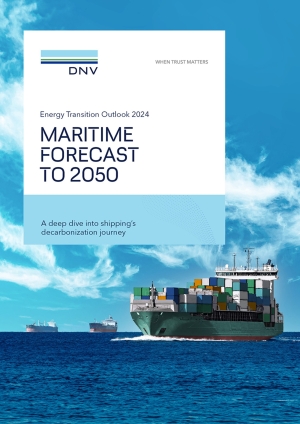


(Posted on 03/09/24)
Reaching shipping’s 2030 decarbonization goal of 20% emission reductions, set by the International Maritime Organization (IMO), will not happen without significant energy savings, according to DNV's latest Maritime Forecast to 2050. The report stresses that, until carbon-neutral fuels become viable, prioritizing the development and use of technologies that reduce energy consumption is crucial for lowering shipping’s emissions.
To reach IMO’s 2030 decarbonization goals shipping will need between 7 and 48 Mtoe of carbon-neutral fuels. However, with the global cross-sector production of carbon-neutral fuels expected to reach only between 44 and 63 Mtoe by 2030, it will be near impossible for shipping to secure its required share. As regulations like the EU Emissions Trading System (ETS) and FuelEU Maritime start to impose costs on emissions, shipowners and managers must therefore explore every option to reduce fuel consumption.
Knut Ørbeck-Nilssen, DNV Maritime CEO, said: "While we are currently witnessing a slowdown of decarbonization in shipping, we are entering an era of unprecedented technological exploration that will drive progress forward. With carbon-neutral fuels in short supply, smart decision-making and strategic investments today are crucial to lay the foundations for future emissions reductions. Prioritizing energy efficiency, leveraging technological solutions, and embracing digitalization are key steps towards reducing the extra cost burden and achieving our decarbonization goals."
The eighth edition of DNV’s Maritime Forecast to 2050 provides an updated outlook on regulations, drivers, technologies and fuels needed for maritime decarbonization, including four scenarios exploring conditions that could accelerate the adoption of specific fuels and technologies by 2050. The report emphasises that regardless of which direction the industry’s decarbonization journey takes, it will come at a significant cost. The four simulated scenarios project these cost increases per transport work; with estimates ranging from 69-75% for bulk carriers, 70-86% for tankers, and 91-112% for container vessels.
“Our latest analyses show that decarbonizing shipping could double the cost of transporting goods by containers”, said Eirik Ovrum, Principal Consultant and Lead Author of Maritime Forecast to 2050. “Ultimately, the rising costs of seaborne transport will need to be passed down the value chain and the market is already seeing trends towards shifting these costs to end-users. To remain competitive, shipowners must develop and execute strategic fleet management plans."
According to the report, reducing energy losses is the most straightforward way for the global fleet to cut emissions. Operational and technical energy efficiency measures can reduce fuel consumption by between 4 and 16% by 2030. Reducing energy consumption by 16% for the world fleet would save 40 Mt of fuel and 120 MtCO2 emissions, which would be equivalent to operating the 55,000 smallest ships or the 2,500 largest ships with carbon-neutral fuel.
Finally, the report emphasises the increasingly important role digitalization plays in complementing operational and technical energy efficiency measures.
Torvald Klaveness has announced the decision to consolidate all digital services under Klaveness Digital... Read more
The International Association of Dry Cargo Shipowners (INTERCARGO) has renewed its call for straightforward... Read more
The Swedish Club has delivered strong results for 2024, posting a USD 34 million profit and significantly... Read more
In line with NORDEN’s positive long-term outlook for Capesize freight rates, the company have... Read more
OrbitMI, a global provider of maritime software and data products, has expanded its workflow capabilities... Read more
Current ClassNK Senior Vice President Hayato Suga has been appointed as President & CEO as well... Read more
The surge in demand for Cape Size bulk carriers will continue for another six weeks, driven on by increased... Read more
OrbitMI, a leading provider of maritime SaaS software, has announced that Istanbul-based Statu Shipping... Read more
“The International Association of Dry Cargo Shipowners (INTERCARGO) is deeply saddened by the... Read more
As the shipping industry continues its transition to carbon-neutral fuels, ammonia and hydrogen are... Read more